人教版七年级下册Unit 12 What did you do last weekend?Section B1a-2c课件(共71张PPT)
文档属性
| 名称 | 人教版七年级下册Unit 12 What did you do last weekend?Section B1a-2c课件(共71张PPT) |  | |
| 格式 | pptx | ||
| 文件大小 | 41.1MB | ||
| 资源类型 | 教案 | ||
| 版本资源 | 人教新目标(Go for it)版 | ||
| 科目 | 英语 | ||
| 更新时间 | 2022-08-24 22:08:54 | ||
图片预览

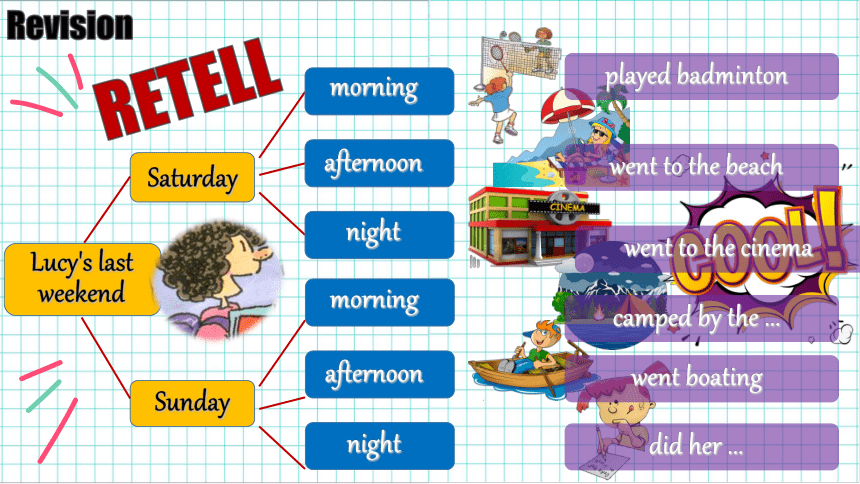
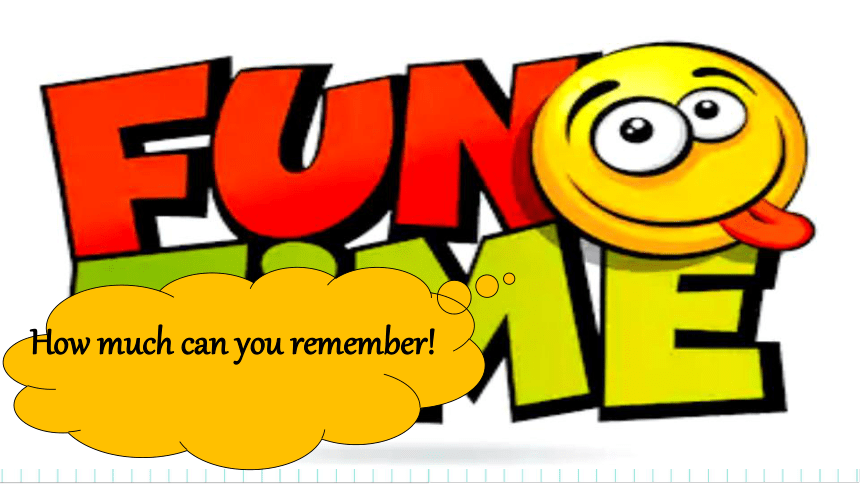
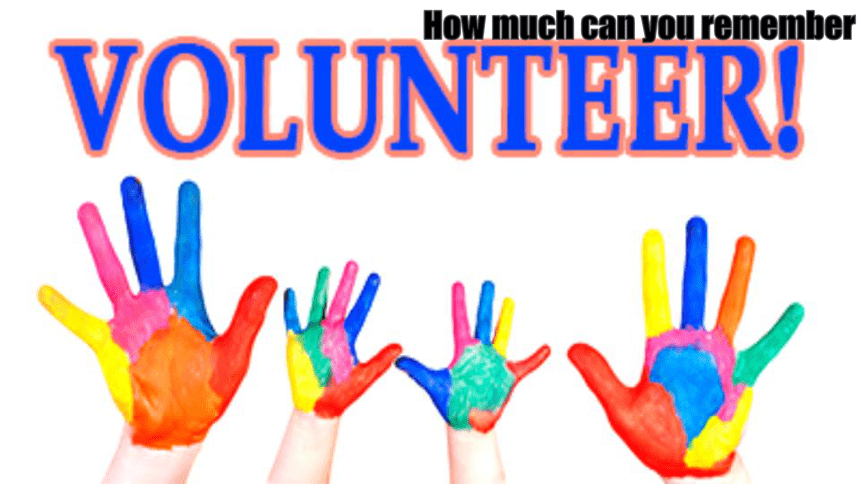
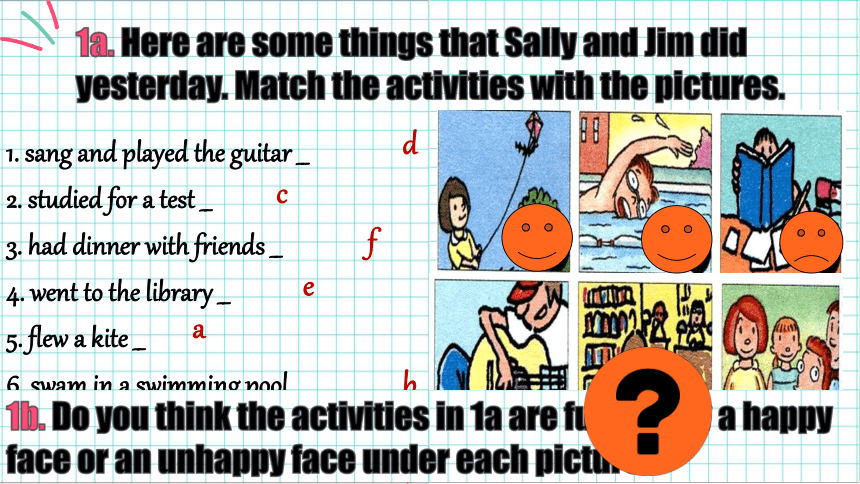
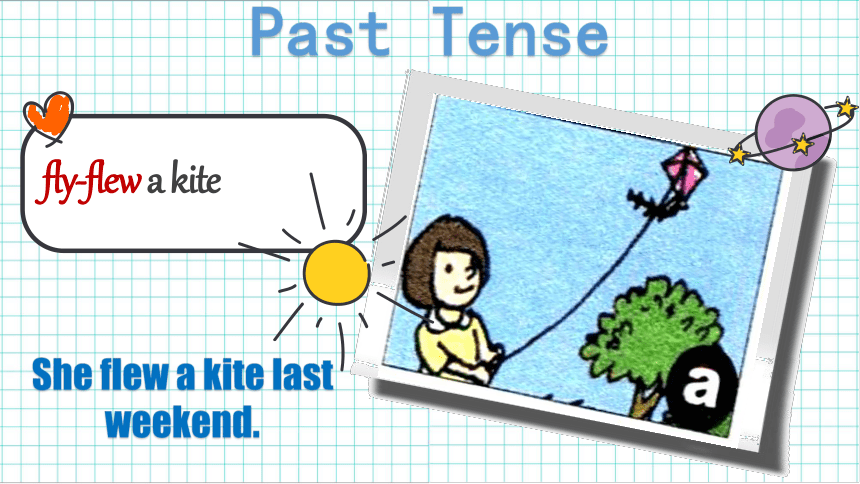
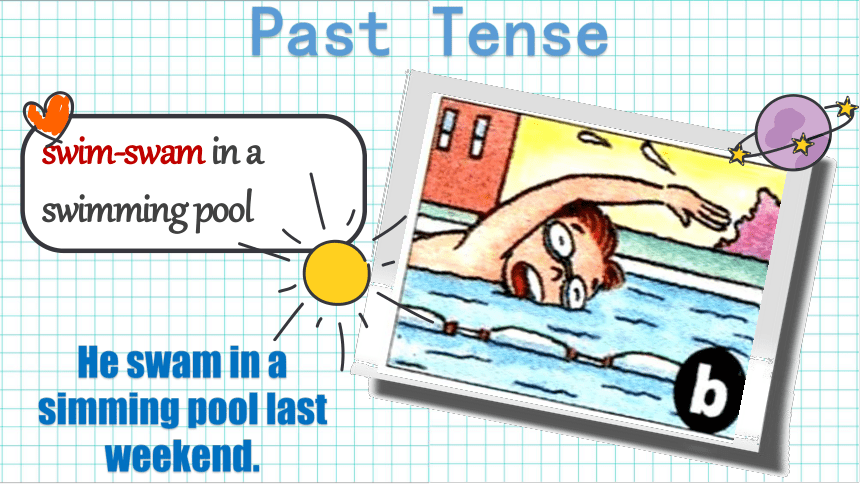
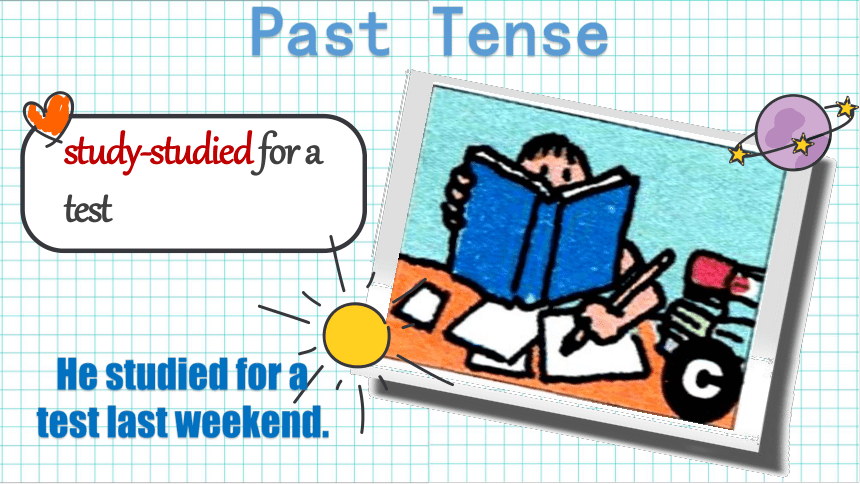

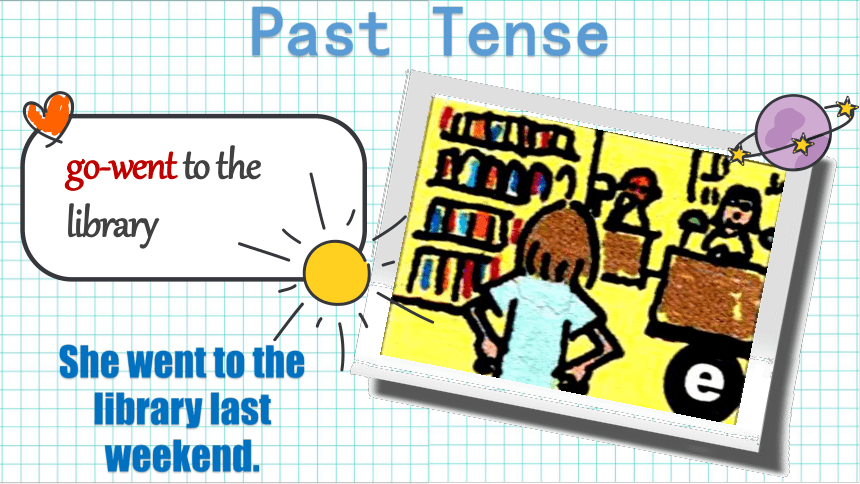
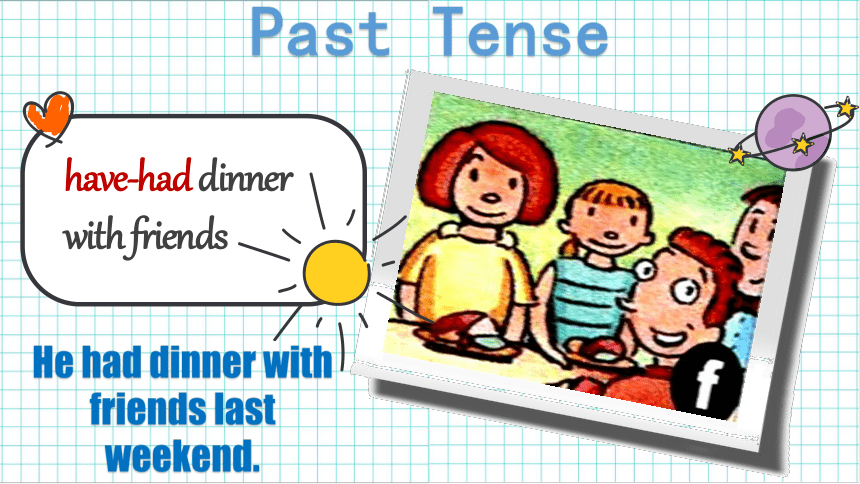
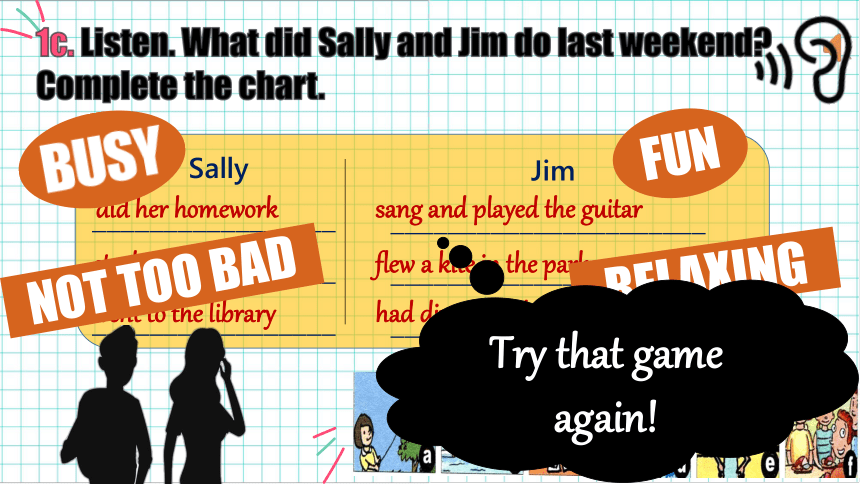
文档简介
(共71张PPT)
周末生活
Unit 12 SecB-1a-3c
What Did You Do Last Weekend?
Revision
Lucy's last weekend
Saturday
Sunday
morning
afternoon
night
morning
afternoon
night
played badminton
went to the beach
went to the cinema
camped by the ...
went boating
did her ...
RETELL
How much can you remember!
I climed the mountains last weekend.
I... He...
I... He... She...
I... He... She...
He...
I... He... She...
He...
She...
How much can you remember
1a. Here are some things that Sally and Jim did yesterday. Match the activities with the pictures.
1. sang and played the guitar __
2. studied for a test __
3. had dinner with friends __
4. went to the library __
5. flew a kite __
6. swam in a swimming pool __
e
d
f
a
c
b
1b. Do you think the activities in 1a are fun Draw a happy face or an unhappy face under each picture.
fly-flew a kite
Past Tense
She flew a kite last weekend.
swim-swam in a swimming pool
Past Tense
He swam in a simming pool last weekend.
study-studied for a test
Past Tense
He studied for a test last weekend.
play-played the guitar
sing-sang
Past Tense
He sang and played the guitar last weekend.
go-went to the library
Past Tense
She went to the library last weekend.
have-had dinner with friends
Past Tense
He had dinner with friends last weekend.
1c. Listen. What did Sally and Jim do last weekend Complete the chart.
Sally
___________________________________________________
Jim
__________________________________________________________________
did her homework
studied for a test
went to the library
sang and played the guitar
flew a kite in the park
had dinner with his friends
NOT TOO BAD
RELAXING
FUN
Try that game
again!
Sally did her homework last weekend.
Sally... Sally studied...
Sally...
Sally... Sally went to ...
Sally...
Sally...
Sally...
Jim sang and...
Sally...
Sally...
Sally...
Jim...
Jim...
How much can you remember
Jim: Hey, Sally! I didn’t see you last weekend .
Sally: Yeah, I stayed at home on Saturday. I was quite busy.
Jim: Why
Sally: I had a lot of things to do.
Jim: Like what
Sally: Well, I did my homework and studied for a test.
Jim: You did Not much fun, huh
Sally: Well, it wasn’t too bad. On Sunday, I went to the library.
How about you Did you go out
Jim: Well, I sang and played the guitar on Saturday morning. On Sunday afternoon, I flew
a kite in the park. And on Sunday night, I had dinner with my friends.
Sally: Wow! you had a relaxing time!
Jim: Yeah, I had fun. But I didn’t do my homework, so school this morning wasn’t fun!
Listen and repeat!
After that, make a mind map like Lucy's weekend.
1d. Make a conversation with a partner. Talk about what Sally and Jim did last weekend.
1d. Make a conversation with a partner. Talk about what Sally and Jim did last weekend.
It was relaxing.
Well. He sang and played the guitar on Saturday morning.
How was Jim’s last weekend
Really What did he do on Saturday
1d. Make a conversation with a partner. Talk about what Sally and Jim did last weekend.
No, he didn’t. He flew a kite in the park on Sunday afternoon.
Well, he had dinner with friends.
Did Jim do his homework on Sunday
What about Sunday evening
1e. Make a conversation. Ask what your partner did last weekend.
Not really, but I visited my sister.
Did you do anything interesting last weekend
1e. Make a conversation. Ask what your partner did last weekend.
I went to the cinema with my friends.
Yes, how about you Did you have a good time
Hi, Bob. What did you do last weekend
You had a relaxing weekend.
Not really. I...
...
Make an Interview
What did your friend do last weekend
time
Saturday morning
Saturday afternoon
Saturday night
Sunday morning
Sunday afternoon
Sunday night
Name: ______
How was your weekend
What did you do
Give a report like this: My friend,… had a busy / nice / happy / great /…
weekend. On Saturday morning, he
/she….
Did you do anything interesting last weekend
上周末你做什么有趣的事情了吗?
形容词修饰something, anything,
nothing等不定代词时,要放在这些不定代词的后面。如:
Come here! I have something important
to tell you.
过来!我有一些重要的事要告诉你。
Language Points
get
keep
sit
sleet
put
tell
wake
- got
- kept
- sat
- put
- told
- woke
Irregular verbs
- slept
They went camping last weekend .
o(^▽^)o
What did they do last weekend
Where
In a forest near the lake
o(^▽^)o
They put up the tent.
What did they do
They made a fire.
They kept warm and cooked on the fire.
When you went camping...
anything “SCARY ”
anything “DANGEROUS”
What are you “AFRAID” of
2a. What kinds of animals are people sometimes
afraid of Why Make a list.
I think people are afraid of tigers, lions and snakes because they’re scary.
mouse
spider
snake
lion
wolf
tiger
PRE-READING
Read the title and the picture. Predict the main idea.
A. An interesting but scary camping trip
B. An scary snake
C. A happy weekend.
PREDICING
A Weekend to Remember
About the snake
BRAINSTORMING
Living habits
(food, place)
How to walk
How to hear
Look
The snake lives in the forest.
The snakes don’t have ears,
but can feel things moving.
The snakes don’t have feet It walks by bending its body from side to side.
Snakes like to eat living animals.
It looks scary.Some are poisonous.
Match each paragraph with the main idea.
FAST READING
A Weekend to Remember
Para1
Para2
Para3
interesting but scary weekend
a happy but tired day
a scary but useful day
Read carefully while listening, and answer the questions.
CAREFUL READING
A Weekend to Remember
1. Where did Lisa and her family go last weekend
2. Why did Lisa and her sister get a terrible surprise
3. Where did the snake go at last
They went camping in a small village in India.
They saw a big snake sleeping near the fire.
It moved into a forest.
There are 270 plus species of snakes in India, out of which about 60 are highly venomous有毒. The big four dangerous snakes of India includes Indian Cobra印度眼镜蛇, Krait金环蛇, Russell’s viper罗素毒蛇 and Saw-scaled viper锯鳞蝰.
Read paragraph 1 carefully and answer the questions.
CAREFUL READING
1. How was Lisa's weekend
2. Where did Lisa and her family go
3. Why did Lisa go there
It was interesting but scary.
They went to a small village in India.
Because her sister finished high school .
8 Best High School Graduation Trip Ideas in America
Disney Parks. Straight to the Beach.
Hollywood. The Big Apple.
Puerto Rico. All About the Food.
Camp Out. Hawaii.
Read paragraph 2 and find how they
spent their first camping day
CAREFUL READING
go camping
take a long bus ride
put up tents
make a fire
cooked food
sit under the moon
tell stories
be tired
go to sleep
went
took
put
made
sat
told
was
went
RETELL
Read paragraph 3 and find how they
spent their next camping day
CAREFUL READING
looked out of
their tent
see a snake sleeping
near the fire
too scared to move
saw
shouted to parents
jumped
up and down
wake the
snake up
woke
moved into
the forest
RETELL
Read the story again and find out the answers to the questions below.
How was Lisa’s weekend
2. Where did Lisa and her family go last weekend
3. How did Lisa feel when she saw the snake
It was interesting but scary.
They went to a small village in India.
She was so scared that she couldn’t move.
Read the story again and find out the answers to the questions below.
4. What did Lisa and her sister do
5. What did their parents do Why did they do that
6. What lesson did Lisa learn from the weekend
They shouted to their parents.
Her father jumped up and down to scare the snake.
Don’t go near snakes./ Snakes can’t hear but they can feel movements.
POST READING
Why
is it a
memorable
weekend ?
A Weekend to Remember
meaningful
special
learn something from it.
unusual
Do you
have
a
memmorable weekend
2C. Put the phrases in order according to the passage. Then use them to retell the story.
POST READING
A Weekend to Remember
___ snake went into the forest
___ put up our tents and cooked food
___ learned a useful lesson
___ saw a snake and shouted to parents for help
___ snakes can’t hear but they can feel things moving
___ my dad jumped up and down in his tent
___ took a bus to a small village in India
___ told stories under the moon, then went to sleep
2
4
6
7
8
1
3
5
A Weekend to Remember! Time the first day the next day
Events
details kids
Dad
Snake /
feeling
lesson can’t hear but can feel things moving. It was important not to go near a snake.
shouted to parents for help
jump up and down in...
moved into the forest
saw a big snake sleeping ...
put up tents and made a fire
sat under the moon and told stories.
But I was so tired that I went to sleep early.
interesting
scary
Do a summary
how
who
what
why
when
where
How was Lisa’s weekend
Who did she go with
RETELL THE STORY
Where did she go
What did she do
Why was her weekend interesting but scary
When did she go
How do we save ourselves when we meet scary animals
“SCARY ”
“DANGEROUS”
something I'm “AFRAID” of
Calm down
Don't disturb it(不要惊扰)
Ask adults to help
Language Points
1. My sister finished high school two weeks ago.
1)finished high school “中学毕业”
finish 后跟v-ing形式,表示 “干完某事”。
I finished reading the book.
2)two weeks ago “两星期前”,
“一段时间 + ago” 意为“多长时间之前”,常与
一般过去时态连用。如:
We visited the History Museum three days ago.
Language Points
2. we took a long bus ride to a lake in the countryside. took a long bus ride to “乘坐长途公交车去...”
ride 此处作可数名词,意为“(乘车的)旅行, 旅程”。 take a ride 兜风
ride 还可作动词,意为“骑(马等);乘(车)等”。
Language Points
3. There we put up our tents and made a fire to keep us warm and cook food on.
(1)put up动词短语,此处意为“搭起”,另外还有
“举起;张贴;建造”之意。e.g. :
Can you help me put up some ads
你能帮我贴广告吗?
put的过去式是put。像这样动词过去式与原形相
同的词还有:cut―cut; read―read; let―let等。
Language Points
3. There we put up our tents and made a fire to keep us warm and cook food on.
(2)made a fire 生火
put on穿上(衣服)
put away放好,把……收起来
put down放下,写下
Language Points
3. There we put up our tents and made a fire to keep us warm and cook food on.
(3) keep us warm 保持我们暖和,
keep +宾语+形容词/ doing sth. 意为“使某人/某物一直处于某种状态或做某事”,e.g.
Please keep the classroom clean. 请保持教室干净。
Don’t keep him waiting. 别让他等。
Language Points
3. There we put up our tents and made a fire to keep us warm and cook food on.
(4) 本句的主体部分是we put up tents and made a fire,
后续的 to keep us warm and cook food on (it) 表达的是made a fire 的目的。句尾介词“on” 后有所省略,
以避免重复。
Language Points
4. On the first night, … , we just sat under the moon and told each other stories.
1)英语中表示一天中的时间用:at night (在夜里)、
in the morning (在上午)、in the evening (在下午)等,
但表示“在具体某一天的上午、下午或晚上”等时
间,常用介词on。例如:
在10月1日的晚上,她得到了一份特别的礼物。
On the evening of October 1st,she got a special gift.
Language Points
4. On the first night, … , we just sat under the moon and told each other stories.
2)each other 互相,彼此 => one another
each other’s 互相的, 彼此的
Language Points
5. But I was so tired that I went to sleep early.
so…that意为“如此...以至于…”, so是副词, 后跟
形容词或副词, that引导表示结果的状语从句。
so...that...的that从句是否定句时, 常可转换含有too...
to...(太…而不能)结构的简单句。too后跟形容词或副词,to后跟动词原形。e.g.
She is so angry that she can't say a word.
= She is too angry to say a word.
Language Points
6.The next morning ,my sister and I got a terrible
surprise. 第二天早上,我和姐姐大吃一惊。
1)the next morning 第二天早上(过去时)
next morning 明天早上(将来时)
2)got a terrible surprise 大吃一惊
Language Points
6.The next morning ,my sister and I got a terrible
surprise. 第二天早上,我和姐姐大吃一惊。
3)surprise的用法:
(1) 作名词, 意为“惊讶; 吃惊”, 常用短语:
get a (terrible) surprise “(大)吃(一)惊 ”
give sb. a surprise “给某人惊喜”
in surprise “惊奇地”
to one’s surprise “令某人惊讶的是”
Language Points
6.The next morning ,my sister and I got a terrible
surprise. 第二天早上,我和姐姐大吃一惊。
3)surprise的用法:
(2) 还可以作及物动词, 意思是“使……惊讶”。
常用短语: surprise sb. , e.g.:
What he said surprised me. 他说的话让我吃惊。
Language Points
6.The next morning ,my sister and I got a terrible
surprise. 第二天早上,我和姐姐大吃一惊。
3)surprise的用法:
(3) surprised/surprising是由动词surprise派生出来的
形容词, surprised“感到惊讶的”(主语人), 常用结构: be surprised at sth. “对某事感到惊讶”
be surprised to do sth. “做某事感到惊讶”
surprising 意为“令人感到惊讶的”(主语物)。
Language Points
7. When we looked out of our tent, we saw a big snake
sleeping near the fire.
1) look out of... “向……外看 ”
out of... “从…里向外” < into “从…外向里”
look out 当心
① Please don’t look out of the window in class.
② look out ! Here comes the cars.
Language Points
7. When we looked out of our tent, we saw a big snake
sleeping near the fire.
2) see sb. doing sth. 看见某人正在做某事
(动作正在发生)
see sb. do sth. 看见某人做了某事
(动作的全过程)
I saw him _playing_(play) soccer on the playground just now.
I saw him _go_(go) into the shop.
Language Points
8. I was so scared that I couldn’t move.
我是如此 的害怕,以至于我不能动了。
scared adj. 恐惧的;惊恐的;担心的 => afraid
常见句型有:
① be scared of sth./doing sth. 害怕某物/做某事
② be scared to do sth. 害怕做某事
Are you scared of the dark
She is scared of staying at home alone.
I'm scared to answer the phone.
Language Points
8. I was so scared that I couldn’t move.
我是如此 的害怕,以至于我不能动了。
辨析:scare, scared, scary
Don't scare the scared children by telling such scary stories.
scare v. 使惊恐
scared adj. (人)恐惧的
scary adj. (物) 恐怖的
Language Points
9. We shouted to our parents to let them know about
about the danger.
1) shout to sb. “向…大喊 ” (无恶意)
shout at sb. (生气) 向…喊
(1) We _shouted to_ the driver, but he didn’t hear us.
(2) Father _shouted at_the girl, and the girl cried.
Language Points
9. We shouted to our parents to let them know about
about the danger.
2) let sb. (not) do sth. 让某人(不要)做某事
3) danger. n.【U】危险 n.【C】危险物(或人);
dangerous adj. 危险的;不安全的
safety n. 安全 safe adj. 安全的
Language Points
10. My dad started to jump up and down in their tent.
我的爸爸开始在帐篷里上下跳跃。
1) start + to v. / v-ing = begin to v. / v-ing开始做某事
The child stared _to cry/ crying_
start/begin with sth. 以某事开始
Let's start with easy things. 咱们从简单的事情开始。
start / begin sth. 创办某物
He started a newspaper. 他创办了一份报纸。
Language Points
10. My dad started to jump up and down in their tent.
我的爸爸开始在帐篷里上下跳跃。
2) jump up and down 上下跳跃
up and down “上上下下;前前后后;来来往往”,
在句中作状语。eg
He walked up and down in the room.他在房里踱来踱去。
He uses a lift to go up and down.他用电梯上上下下。
类似的短语有day and night日日夜夜 here and there到处
Language Points
11. My dad told me later that snakes don’t have ears
but he can feel things moving.
英语中表示感官的动词, 如see, hear, feel 等动词后
可以接动词-ing 短语作宾语补足语。
see/watch/feel/hear sb. doing sth.
看到/观察到/觉得/听到某人在做某事
① I can hear the children singing in the classroom.
我能听到孩子们正在教室里唱歌。
Language Points
11. My dad told me later that snakes don’t have ears
but he can feel things moving.
② We can hear water running from the mountain.
我们能听到水从山上流下来的声音。
Language Points
12. This woke the snake up and it moved ...
wake up (动副短语)有两个意思:
① 当“醒来”讲,是不及物短语动词;
I usually wake up at six in the morning.
② 当 “唤醒”讲,是及物短语动词,若跟名词作宾
语,可中可后; 如果跟代词作宾语,必须放于中间。
例如: 请在6点叫醒Lucy。
Please wake up Lucy at six o’clock.
Lily is sleeping. Don’t wake her up.
Language Points
15. This was a very useful lesson for me.
⑴ lesson /'lesn/ n. 教训,经验
a very useful lesson 一次很有用的教训(课)
teach sb. a lesson 给某人一个教训
learn a lesson 得到一次教训
⑵ useful adj “有用的” use v. “使用”
⑶ for sb 对某人来说
1. She went ____ the kitchen to cook some food.
2. The ______ circles (围绕) the earth every 28 days.
3. They came to visit China two days ____.
4. Do you know how to put up a ____
5. She got a great ________ when she got the Iphone 5.
6. My grandparents ______to the countryside last year. They lived with my uncle in a village.
7. She _______ to learn English when she was ten.
8. She was really ______ to cross the rope way.
ago tent surprise moon scared move start into
EXERCISE
tent
into
ago
moon
surprise
moved
started
scared
EXERCISE
1. Listen! Someone is shouting ____ us ____ help.
A. at; of B. to; for C. at; with D. to; on
2. When we came in, we saw him ___ on the ground(地面).
A. lied B. lying C. lay D. to lie
3. —How do you like the movie Kung Fu Panda 3
—It is ____ exciting ____ I'd like to see it again.
A. so; that B. such; that
C. enough; to D. too; to
B
B
A
HOMEWORK
THANK YOU
周末生活
Unit 12 SecB-1a-3c
What Did You Do Last Weekend?
Revision
Lucy's last weekend
Saturday
Sunday
morning
afternoon
night
morning
afternoon
night
played badminton
went to the beach
went to the cinema
camped by the ...
went boating
did her ...
RETELL
How much can you remember!
I climed the mountains last weekend.
I... He...
I... He... She...
I... He... She...
He...
I... He... She...
He...
She...
How much can you remember
1a. Here are some things that Sally and Jim did yesterday. Match the activities with the pictures.
1. sang and played the guitar __
2. studied for a test __
3. had dinner with friends __
4. went to the library __
5. flew a kite __
6. swam in a swimming pool __
e
d
f
a
c
b
1b. Do you think the activities in 1a are fun Draw a happy face or an unhappy face under each picture.
fly-flew a kite
Past Tense
She flew a kite last weekend.
swim-swam in a swimming pool
Past Tense
He swam in a simming pool last weekend.
study-studied for a test
Past Tense
He studied for a test last weekend.
play-played the guitar
sing-sang
Past Tense
He sang and played the guitar last weekend.
go-went to the library
Past Tense
She went to the library last weekend.
have-had dinner with friends
Past Tense
He had dinner with friends last weekend.
1c. Listen. What did Sally and Jim do last weekend Complete the chart.
Sally
___________________________________________________
Jim
__________________________________________________________________
did her homework
studied for a test
went to the library
sang and played the guitar
flew a kite in the park
had dinner with his friends
NOT TOO BAD
RELAXING
FUN
Try that game
again!
Sally did her homework last weekend.
Sally... Sally studied...
Sally...
Sally... Sally went to ...
Sally...
Sally...
Sally...
Jim sang and...
Sally...
Sally...
Sally...
Jim...
Jim...
How much can you remember
Jim: Hey, Sally! I didn’t see you last weekend .
Sally: Yeah, I stayed at home on Saturday. I was quite busy.
Jim: Why
Sally: I had a lot of things to do.
Jim: Like what
Sally: Well, I did my homework and studied for a test.
Jim: You did Not much fun, huh
Sally: Well, it wasn’t too bad. On Sunday, I went to the library.
How about you Did you go out
Jim: Well, I sang and played the guitar on Saturday morning. On Sunday afternoon, I flew
a kite in the park. And on Sunday night, I had dinner with my friends.
Sally: Wow! you had a relaxing time!
Jim: Yeah, I had fun. But I didn’t do my homework, so school this morning wasn’t fun!
Listen and repeat!
After that, make a mind map like Lucy's weekend.
1d. Make a conversation with a partner. Talk about what Sally and Jim did last weekend.
1d. Make a conversation with a partner. Talk about what Sally and Jim did last weekend.
It was relaxing.
Well. He sang and played the guitar on Saturday morning.
How was Jim’s last weekend
Really What did he do on Saturday
1d. Make a conversation with a partner. Talk about what Sally and Jim did last weekend.
No, he didn’t. He flew a kite in the park on Sunday afternoon.
Well, he had dinner with friends.
Did Jim do his homework on Sunday
What about Sunday evening
1e. Make a conversation. Ask what your partner did last weekend.
Not really, but I visited my sister.
Did you do anything interesting last weekend
1e. Make a conversation. Ask what your partner did last weekend.
I went to the cinema with my friends.
Yes, how about you Did you have a good time
Hi, Bob. What did you do last weekend
You had a relaxing weekend.
Not really. I...
...
Make an Interview
What did your friend do last weekend
time
Saturday morning
Saturday afternoon
Saturday night
Sunday morning
Sunday afternoon
Sunday night
Name: ______
How was your weekend
What did you do
Give a report like this: My friend,… had a busy / nice / happy / great /…
weekend. On Saturday morning, he
/she….
Did you do anything interesting last weekend
上周末你做什么有趣的事情了吗?
形容词修饰something, anything,
nothing等不定代词时,要放在这些不定代词的后面。如:
Come here! I have something important
to tell you.
过来!我有一些重要的事要告诉你。
Language Points
get
keep
sit
sleet
put
tell
wake
- got
- kept
- sat
- put
- told
- woke
Irregular verbs
- slept
They went camping last weekend .
o(^▽^)o
What did they do last weekend
Where
In a forest near the lake
o(^▽^)o
They put up the tent.
What did they do
They made a fire.
They kept warm and cooked on the fire.
When you went camping...
anything “SCARY ”
anything “DANGEROUS”
What are you “AFRAID” of
2a. What kinds of animals are people sometimes
afraid of Why Make a list.
I think people are afraid of tigers, lions and snakes because they’re scary.
mouse
spider
snake
lion
wolf
tiger
PRE-READING
Read the title and the picture. Predict the main idea.
A. An interesting but scary camping trip
B. An scary snake
C. A happy weekend.
PREDICING
A Weekend to Remember
About the snake
BRAINSTORMING
Living habits
(food, place)
How to walk
How to hear
Look
The snake lives in the forest.
The snakes don’t have ears,
but can feel things moving.
The snakes don’t have feet It walks by bending its body from side to side.
Snakes like to eat living animals.
It looks scary.Some are poisonous.
Match each paragraph with the main idea.
FAST READING
A Weekend to Remember
Para1
Para2
Para3
interesting but scary weekend
a happy but tired day
a scary but useful day
Read carefully while listening, and answer the questions.
CAREFUL READING
A Weekend to Remember
1. Where did Lisa and her family go last weekend
2. Why did Lisa and her sister get a terrible surprise
3. Where did the snake go at last
They went camping in a small village in India.
They saw a big snake sleeping near the fire.
It moved into a forest.
There are 270 plus species of snakes in India, out of which about 60 are highly venomous有毒. The big four dangerous snakes of India includes Indian Cobra印度眼镜蛇, Krait金环蛇, Russell’s viper罗素毒蛇 and Saw-scaled viper锯鳞蝰.
Read paragraph 1 carefully and answer the questions.
CAREFUL READING
1. How was Lisa's weekend
2. Where did Lisa and her family go
3. Why did Lisa go there
It was interesting but scary.
They went to a small village in India.
Because her sister finished high school .
8 Best High School Graduation Trip Ideas in America
Disney Parks. Straight to the Beach.
Hollywood. The Big Apple.
Puerto Rico. All About the Food.
Camp Out. Hawaii.
Read paragraph 2 and find how they
spent their first camping day
CAREFUL READING
go camping
take a long bus ride
put up tents
make a fire
cooked food
sit under the moon
tell stories
be tired
go to sleep
went
took
put
made
sat
told
was
went
RETELL
Read paragraph 3 and find how they
spent their next camping day
CAREFUL READING
looked out of
their tent
see a snake sleeping
near the fire
too scared to move
saw
shouted to parents
jumped
up and down
wake the
snake up
woke
moved into
the forest
RETELL
Read the story again and find out the answers to the questions below.
How was Lisa’s weekend
2. Where did Lisa and her family go last weekend
3. How did Lisa feel when she saw the snake
It was interesting but scary.
They went to a small village in India.
She was so scared that she couldn’t move.
Read the story again and find out the answers to the questions below.
4. What did Lisa and her sister do
5. What did their parents do Why did they do that
6. What lesson did Lisa learn from the weekend
They shouted to their parents.
Her father jumped up and down to scare the snake.
Don’t go near snakes./ Snakes can’t hear but they can feel movements.
POST READING
Why
is it a
memorable
weekend ?
A Weekend to Remember
meaningful
special
learn something from it.
unusual
Do you
have
a
memmorable weekend
2C. Put the phrases in order according to the passage. Then use them to retell the story.
POST READING
A Weekend to Remember
___ snake went into the forest
___ put up our tents and cooked food
___ learned a useful lesson
___ saw a snake and shouted to parents for help
___ snakes can’t hear but they can feel things moving
___ my dad jumped up and down in his tent
___ took a bus to a small village in India
___ told stories under the moon, then went to sleep
2
4
6
7
8
1
3
5
A Weekend to Remember! Time the first day the next day
Events
details kids
Dad
Snake /
feeling
lesson can’t hear but can feel things moving. It was important not to go near a snake.
shouted to parents for help
jump up and down in...
moved into the forest
saw a big snake sleeping ...
put up tents and made a fire
sat under the moon and told stories.
But I was so tired that I went to sleep early.
interesting
scary
Do a summary
how
who
what
why
when
where
How was Lisa’s weekend
Who did she go with
RETELL THE STORY
Where did she go
What did she do
Why was her weekend interesting but scary
When did she go
How do we save ourselves when we meet scary animals
“SCARY ”
“DANGEROUS”
something I'm “AFRAID” of
Calm down
Don't disturb it(不要惊扰)
Ask adults to help
Language Points
1. My sister finished high school two weeks ago.
1)finished high school “中学毕业”
finish 后跟v-ing形式,表示 “干完某事”。
I finished reading the book.
2)two weeks ago “两星期前”,
“一段时间 + ago” 意为“多长时间之前”,常与
一般过去时态连用。如:
We visited the History Museum three days ago.
Language Points
2. we took a long bus ride to a lake in the countryside. took a long bus ride to “乘坐长途公交车去...”
ride 此处作可数名词,意为“(乘车的)旅行, 旅程”。 take a ride 兜风
ride 还可作动词,意为“骑(马等);乘(车)等”。
Language Points
3. There we put up our tents and made a fire to keep us warm and cook food on.
(1)put up动词短语,此处意为“搭起”,另外还有
“举起;张贴;建造”之意。e.g. :
Can you help me put up some ads
你能帮我贴广告吗?
put的过去式是put。像这样动词过去式与原形相
同的词还有:cut―cut; read―read; let―let等。
Language Points
3. There we put up our tents and made a fire to keep us warm and cook food on.
(2)made a fire 生火
put on穿上(衣服)
put away放好,把……收起来
put down放下,写下
Language Points
3. There we put up our tents and made a fire to keep us warm and cook food on.
(3) keep us warm 保持我们暖和,
keep +宾语+形容词/ doing sth. 意为“使某人/某物一直处于某种状态或做某事”,e.g.
Please keep the classroom clean. 请保持教室干净。
Don’t keep him waiting. 别让他等。
Language Points
3. There we put up our tents and made a fire to keep us warm and cook food on.
(4) 本句的主体部分是we put up tents and made a fire,
后续的 to keep us warm and cook food on (it) 表达的是made a fire 的目的。句尾介词“on” 后有所省略,
以避免重复。
Language Points
4. On the first night, … , we just sat under the moon and told each other stories.
1)英语中表示一天中的时间用:at night (在夜里)、
in the morning (在上午)、in the evening (在下午)等,
但表示“在具体某一天的上午、下午或晚上”等时
间,常用介词on。例如:
在10月1日的晚上,她得到了一份特别的礼物。
On the evening of October 1st,she got a special gift.
Language Points
4. On the first night, … , we just sat under the moon and told each other stories.
2)each other 互相,彼此 => one another
each other’s 互相的, 彼此的
Language Points
5. But I was so tired that I went to sleep early.
so…that意为“如此...以至于…”, so是副词, 后跟
形容词或副词, that引导表示结果的状语从句。
so...that...的that从句是否定句时, 常可转换含有too...
to...(太…而不能)结构的简单句。too后跟形容词或副词,to后跟动词原形。e.g.
She is so angry that she can't say a word.
= She is too angry to say a word.
Language Points
6.The next morning ,my sister and I got a terrible
surprise. 第二天早上,我和姐姐大吃一惊。
1)the next morning 第二天早上(过去时)
next morning 明天早上(将来时)
2)got a terrible surprise 大吃一惊
Language Points
6.The next morning ,my sister and I got a terrible
surprise. 第二天早上,我和姐姐大吃一惊。
3)surprise的用法:
(1) 作名词, 意为“惊讶; 吃惊”, 常用短语:
get a (terrible) surprise “(大)吃(一)惊 ”
give sb. a surprise “给某人惊喜”
in surprise “惊奇地”
to one’s surprise “令某人惊讶的是”
Language Points
6.The next morning ,my sister and I got a terrible
surprise. 第二天早上,我和姐姐大吃一惊。
3)surprise的用法:
(2) 还可以作及物动词, 意思是“使……惊讶”。
常用短语: surprise sb. , e.g.:
What he said surprised me. 他说的话让我吃惊。
Language Points
6.The next morning ,my sister and I got a terrible
surprise. 第二天早上,我和姐姐大吃一惊。
3)surprise的用法:
(3) surprised/surprising是由动词surprise派生出来的
形容词, surprised“感到惊讶的”(主语人), 常用结构: be surprised at sth. “对某事感到惊讶”
be surprised to do sth. “做某事感到惊讶”
surprising 意为“令人感到惊讶的”(主语物)。
Language Points
7. When we looked out of our tent, we saw a big snake
sleeping near the fire.
1) look out of... “向……外看 ”
out of... “从…里向外” < into “从…外向里”
look out 当心
① Please don’t look out of the window in class.
② look out ! Here comes the cars.
Language Points
7. When we looked out of our tent, we saw a big snake
sleeping near the fire.
2) see sb. doing sth. 看见某人正在做某事
(动作正在发生)
see sb. do sth. 看见某人做了某事
(动作的全过程)
I saw him _playing_(play) soccer on the playground just now.
I saw him _go_(go) into the shop.
Language Points
8. I was so scared that I couldn’t move.
我是如此 的害怕,以至于我不能动了。
scared adj. 恐惧的;惊恐的;担心的 => afraid
常见句型有:
① be scared of sth./doing sth. 害怕某物/做某事
② be scared to do sth. 害怕做某事
Are you scared of the dark
She is scared of staying at home alone.
I'm scared to answer the phone.
Language Points
8. I was so scared that I couldn’t move.
我是如此 的害怕,以至于我不能动了。
辨析:scare, scared, scary
Don't scare the scared children by telling such scary stories.
scare v. 使惊恐
scared adj. (人)恐惧的
scary adj. (物) 恐怖的
Language Points
9. We shouted to our parents to let them know about
about the danger.
1) shout to sb. “向…大喊 ” (无恶意)
shout at sb. (生气) 向…喊
(1) We _shouted to_ the driver, but he didn’t hear us.
(2) Father _shouted at_the girl, and the girl cried.
Language Points
9. We shouted to our parents to let them know about
about the danger.
2) let sb. (not) do sth. 让某人(不要)做某事
3) danger. n.【U】危险 n.【C】危险物(或人);
dangerous adj. 危险的;不安全的
safety n. 安全 safe adj. 安全的
Language Points
10. My dad started to jump up and down in their tent.
我的爸爸开始在帐篷里上下跳跃。
1) start + to v. / v-ing = begin to v. / v-ing开始做某事
The child stared _to cry/ crying_
start/begin with sth. 以某事开始
Let's start with easy things. 咱们从简单的事情开始。
start / begin sth. 创办某物
He started a newspaper. 他创办了一份报纸。
Language Points
10. My dad started to jump up and down in their tent.
我的爸爸开始在帐篷里上下跳跃。
2) jump up and down 上下跳跃
up and down “上上下下;前前后后;来来往往”,
在句中作状语。eg
He walked up and down in the room.他在房里踱来踱去。
He uses a lift to go up and down.他用电梯上上下下。
类似的短语有day and night日日夜夜 here and there到处
Language Points
11. My dad told me later that snakes don’t have ears
but he can feel things moving.
英语中表示感官的动词, 如see, hear, feel 等动词后
可以接动词-ing 短语作宾语补足语。
see/watch/feel/hear sb. doing sth.
看到/观察到/觉得/听到某人在做某事
① I can hear the children singing in the classroom.
我能听到孩子们正在教室里唱歌。
Language Points
11. My dad told me later that snakes don’t have ears
but he can feel things moving.
② We can hear water running from the mountain.
我们能听到水从山上流下来的声音。
Language Points
12. This woke the snake up and it moved ...
wake up (动副短语)有两个意思:
① 当“醒来”讲,是不及物短语动词;
I usually wake up at six in the morning.
② 当 “唤醒”讲,是及物短语动词,若跟名词作宾
语,可中可后; 如果跟代词作宾语,必须放于中间。
例如: 请在6点叫醒Lucy。
Please wake up Lucy at six o’clock.
Lily is sleeping. Don’t wake her up.
Language Points
15. This was a very useful lesson for me.
⑴ lesson /'lesn/ n. 教训,经验
a very useful lesson 一次很有用的教训(课)
teach sb. a lesson 给某人一个教训
learn a lesson 得到一次教训
⑵ useful adj “有用的” use v. “使用”
⑶ for sb 对某人来说
1. She went ____ the kitchen to cook some food.
2. The ______ circles (围绕) the earth every 28 days.
3. They came to visit China two days ____.
4. Do you know how to put up a ____
5. She got a great ________ when she got the Iphone 5.
6. My grandparents ______to the countryside last year. They lived with my uncle in a village.
7. She _______ to learn English when she was ten.
8. She was really ______ to cross the rope way.
ago tent surprise moon scared move start into
EXERCISE
tent
into
ago
moon
surprise
moved
started
scared
EXERCISE
1. Listen! Someone is shouting ____ us ____ help.
A. at; of B. to; for C. at; with D. to; on
2. When we came in, we saw him ___ on the ground(地面).
A. lied B. lying C. lay D. to lie
3. —How do you like the movie Kung Fu Panda 3
—It is ____ exciting ____ I'd like to see it again.
A. so; that B. such; that
C. enough; to D. too; to
B
B
A
HOMEWORK
THANK YOU
同课章节目录
- Unit 1 Can you play the guitar?
- Section A
- Section B
- Unit 2 What time do you go to school?
- Section A
- Section B
- Unit 3 How do you get to school?
- Section A
- Section B
- Unit 4 Don't eat in class.
- Section A
- Section B
- Unit 5 Why do you like pandas?
- Section A
- Section B
- Unit 6 I'm watching TV.
- Section A
- Section B
- Review of Units 1-6
- Unit 7 It's raining!
- Section A
- Section B
- Unit 8 Is there a post office near here?
- Section A
- Section B
- Unit 9 What does he look like?
- Section A
- Section B
- Unit 10 I'd like some noodles.
- Section A
- Section B
- Unit 11 How was your school trip?
- Section A
- Section B
- Unit 12 What did you do last weekend?
- Section A
- Section B
